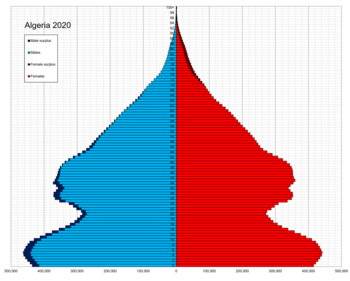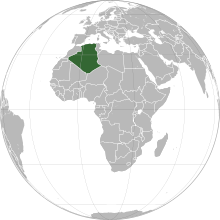
Back التركيبة السكانية في الجزائر Arabic Население на Алжир Bulgarian Алжазаирин бахархой CE Demografía de Argelia Spanish Démographie de l'Algérie French Demografía de Alxeria Galician Ալժիրի բնակչություն Armenian 알제리의 인구 Korean Демографија на Алжир Macedonian Demografi Algeria Malay
| Demographics of Algeria | |
|---|---|
 Population pyramid of Algeria in 2020 | |
| Population | 46,814,258 (2024 est.) |
| Growth rate | 1.52% (2023.) |
| Birth rate | 19.32 births/1,000 population (2023) |
| Death rate | 4.15 deaths/1,000 population (2023) |
| Life expectancy | 79.6 years (2023) |
| • male | 78.2 years (2023) |
| • female | 81 years (2023) |
| Fertility rate | 2.32 children |
| Infant mortality rate | 19.9 deaths/1,000 live births (2023) |
| Net migration rate | -0.82 migrant(s)/1,000 population |
| Sex ratio | |
| Total | 1.03 male(s)/female (2022 est.) |
| At birth | 1.05 male(s)/female |
| Nationality | |
| Nationality | Algerian |
| Major ethnic | Arabs (73.6%)[1] |
| Minor ethnic |
|
| Language | |
| Official | Arabic, Amazigh[2] |
| Spoken | Arabic, Amazigh[2] |


Demographic features of the population of Algeria include population density, ethnicity, education level, health of the populace, economic status, religious affiliations and other aspects. All figures are from National Office of Statistics Algeria[3] and the United Nations Demographic Yearbooks[4], unless otherwise indicated.
Ninety-one percent of the Algerian population lives along the Mediterranean coast on 12% of the country's total land mass. 75% of the population is urban, and urbanization continues, despite government efforts to discourage migration to the cities.
97% of the population follows Sunni Islam; the few non-Sunni Muslims are mainly Ibadis from the Mozabite valley at 1.3%[citation needed] (see Islam in Algeria).
Christianity in Algeria constitutes about 1% of the total population.[5] While significantly greater during the French colonial years, a mostly foreign Roman Catholic community still exists, as do some Protestants. The Jewish community of Algeria, which once constituted 2% of the total population,[citation needed] has substantially decreased due to emigration, mostly to France and Israel.
Algeria's educational system has grown rapidly since 1962. In 2022, there were almost 11 million pupils and 2 million students.[6] Education is free and compulsory to age 16. Modest numbers of Algerian students study abroad, primarily in France and French-speaking Canada. In 2000, the government launched a major review of the country's educational system.
- ^ a b "Algeria | Flag, Capital, Population, Map, & Language | Britannica". www.britannica.com. Retrieved 18 September 2022.
- ^ a b Languages of Algeria, Britannica
- ^ "National Office of Statistics". 9 June 2015. Archived from the original on 6 March 2012.
- ^ "United Nations Statistics Division - Demographic and Social Statistics". unstats.un.org. Retrieved 9 June 2015.
- ^ "Algeria: Hope in a Hidden Church | EWTN". EWTN Global Catholic Television Network. Retrieved 27 June 2024.
- ^ "Rentrée scolaire 2022-2023: Onze millions d'élèves scolarisés - L'Express Algérie" (in French). 11 September 2022. Retrieved 16 May 2023.